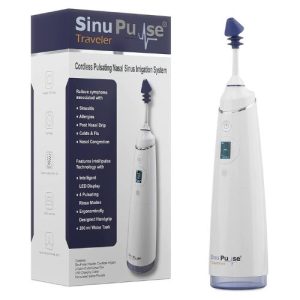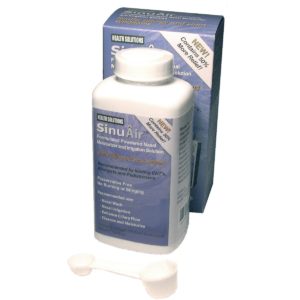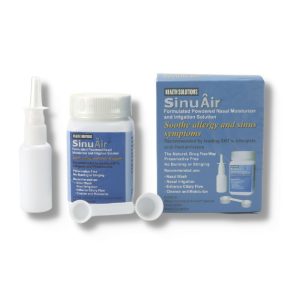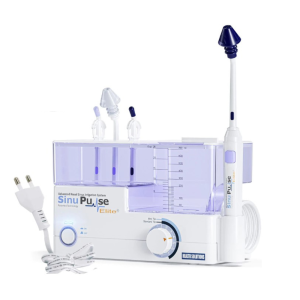Relief for Nasal-Related Tinnitus
What is Tinnitus?
Tinnitus is the perception of sound in the absence of an external source. It is a common condition that affects a significant portion of the population and is usually described as a ringing or buzzing sound in the ears. Tinnitus can also take the form of other sounds, such as hissing, humming, or whistling and can be continuous or intermittent. It can be perceived in one ear, both ears, or in the head. In some cases, tinnitus can be so loud that it interferes with a person’s ability to hear or concentrate and impacts their daily activities, sleep, and overall quality of life.
Tinnitus is a common issue affecting 15% to 20% of people in the UK and more than 50 million people in the USA. People over 65 are at a higher risk of developing the issue.
However, it is generally not a serious medical condition and can often be managed with treatment. Here we explore the causes of tinnitus and look at how nasal irrigation can be used to treat it.
Causes of tinnitus
There are many potential causes of tinnitus, including:
- Exposure to loud noise: Prolonged exposure to loud noises, such as those from heavy machinery, firearms, or loud music, can damage the hair cells in the inner ear and lead to tinnitus.
- Age-related hearing loss: As we age, it is common for our hearing to decline, which can lead to tinnitus.
- Earwax build-up: Excessive earwax can block the ear canal and lead to tinnitus.
- Ear or sinus infections: Infections in the ear or sinus can cause inflammation and fluid build-up, leading to tinnitus.
- Medicines: Some medications, such as certain antibiotics, antidepressants, and blood pressure medications, can cause tinnitus as a side effect.
- Head or neck injuries: Trauma to the head or neck, such as a concussion or whiplash, can cause tinnitus.
- Ménière’s disease: This is a disorder of the inner ear that can cause vertigo, hearing loss, and tinnitus.
- Thyroid dysfunction: Tinnitus is a common effect of Thyroid dysfunction and a lot of people diagnosed with Thyroid dysfunction experience ringing in the ears.
- Stress: Stress can be a side effect of tinnitus since the noises in the head can be very stressful. For some tinnitus may be caused by stress.
Over 80% of people who suffer from tinnitus find it subsides after overcoming a stressful period.
Sinus Irrigation for Tinnitus Relief
We are the exclusive UK distributor for the SinuPulse Elite Nasal Irrigation System.

If your tinnitus is a result of sinus problems or allergies, sinus irrigation can quickly and effectively reduce your symptoms. Sinus-irrigation flushes out mucus, bacteria and allergens from your nasal passages and sinuses and reduces inflammation. This clears the pressure built up in your head and reduces, or even eliminates tinnitus. Within just a few days, you could see a significant reduction in your symptoms and get back to living your life.

Tinnitus and menopause
There is some evidence to suggest that tinnitus may be more common in women who are experiencing menopause. This may be due to changes in hormone levels that occur during menopause, which can affect the way the body processes sound and potentially lead to tinnitus. It is also possible that tinnitus may be more common in women during menopause due to an increased likelihood of experiencing age-related hearing loss, as hearing loss becomes more common as we get older.
Is tinnitus a brain problem?
Tinnitus is not a brain condition; however, it can negatively affect the brain. The condition makes the brain more attentive and less alert. This is because the brain finds it difficult to fully relax due to focusing on persistent noises. The brain focuses too much on the ringing, making people less reactive to situations around them.
Can tinnitus go away?
Tinnitus can be either temporary or chronic, depending on its underlying cause. For most people, it will go away by itself within a few weeks, depending on the cause. If it doesn’t go away and the symptoms keep reoccurring, you should visit your GP to investigate any underlying cause. Visiting your doctor sooner rather than later gives you time to reduce the risk of further health conditions developing.
Some people with tinnitus find it doesn’t go away, which is called chronic tinnitus. This can be due to more severe reasons, such as exposure to loud noises or hearing loss.
Sinus related tinnitus
Tinnitus can also be caused, or made worse, by sinus problems. The ear, nose and throat are all linked together, and a problem with one can have repercussions with another. This is why hospitals have specific ENT (ear, nose and throat) departments.
Blocked nasal passages and excessive fluid production in the sinuses can cause tinnitus and worsen an existing condition. When the Eustachian Tube is blocked, the pressure builds up around the eardrum, which is ultimately what causes ringing in the ears (tinnitus). An example of a sinus-related condition is severe congestion or sinusitis.






